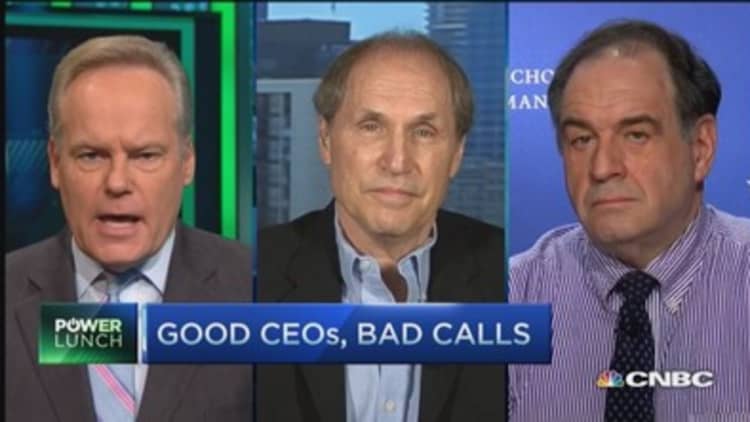
Remember New Coke, or Lululemon's sheer pants?
Blunders by companies, and the executives who run them, can sometimes lead to disastrous results when a snap decision quickly jumps the rails. However, how those execs handle the problem can sometimes make the difference between recovery or career suicide, according to experts.
"You admit it, and you don't throw other people under the bus. You come right out and you say, 'I made the mistake, it all falls on me,' " said Jeff Wolf, president of Wolf Management Consultants and author of "Seven Disciplines of a Leader."
It's an approach seen at the Super Bowl last week, after Seattle Seahawks coach Pete Carroll made a disastrous decision to call a pass play instead of running it in a yard from the goal. The snap judgment, widely derided as one of the worst in Super Bowl history, cost his team the championship. Ultimately, Carroll took full responsibility for making the call.
"He really did fall on his sword, and that's what CEOs do," Wolf said in an interview with "Power Lunch."
A tale of two lead balloons: Cola and Yoga pants
If a flub occurs, leaders should do a post-mortem, figure out how it happened and try to make good as best you can, said Jeffrey Sonnenfeld, senior associate dean at Yale School of Management and a CNBC contributor.
Read More McDonald's CEO steps down after tumultuous year
His case in point: Coca-Cola.
The beverage giant's mistake came in 1985, when it did virtually no market research before replacing its beloved Coke with New Coke. As Sonnenfeld explained, the public revolted and the company's red-faced management was forced to bring the original formula back within months. Paradoxically, the quick about-face helped boost Coke's credibility.
Coca-Cola's recovery was so "brilliant" that people thought the company engineered the whole thing to boost sales, Sonnenfeld said. "Accountability really helps when you own up to it."
Lululemon, on the other hand, didn't handle its 2013 see-through yoga pants fiasco quite as well, he said. CEO Christine Day stepped down later that year, although no reason was given for her departure.
Its founder, Chip Wilson, also caused a furor after saying the company's pants were wrong for certain body types after there were complaints of pilling. He stepped down as chairman later that year, and resigned from the board just this week—but without apologizing, Sonnenfeld noted.
Of course, it would be best if a mistake was not made in the first place, yet even good CEOs can make bad decisions. Sometimes executives are so sure of their approach, Sonnenfeld said, they don't check around and a groupthink mentality sets in.
Read MoreYou won't believe these company perks
They may also be under pressure to innovate, Wolf added. "We're in a process in the world today where you have to change or die, so sometimes CEOs change for the sake of change."
Wolf said CEOs should make sure there is a good corporate culture, people are thinking clearly and prepared, and have contingency plans in place if things go wrong.
—CNBC's Jackson Burke and Reuters contributed to this report


